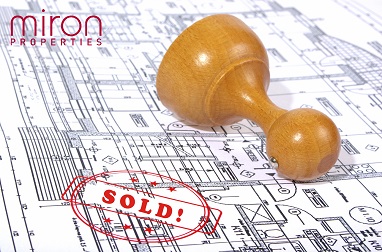Finding a home that might be “the one” is at once exciting and overwhelming. The process of making an offer on a potential new home, the subsequent negotiations that culminate in a signed purchase contract and the steps that follow all the way through the closing, where the house becomes yours, can feel like vast and unfamiliar territory. It is reassuring to have an experienced real estate professional by your side, to guide you through the process.
Making An Offer: If you have decided to make an offer on a property, the first question that often arises is what the offer should be. There is no set formula that will provide you with a “magic number” for your initial offer; and, there are many factors to consider when determining where you should come in with your initial offer. An experienced Realtor will assist you in this endeavor, by providing you with information such as the number of homes like this one currently on the market, the values of those homes and the prices that homes like this one have sold for recently. Further, your Realtor will advise you on other ways to make your offer as attractive as possible. Once you determine what your offer will be, your Realtor will present your offer to the Seller and/or Seller’s Realtor, in writing, with a deposit, which will be placed into a trust account if the offer is accepted and will be returned to you if an agreement is not reached.
Negotiations: After making an initial offer, the seller will usually make a counter-offer, thus beginning the negotiations. Your Realtor will negotiate on your behalf and should be your zealous advocate in reaching the most optimal price, terms and conditions for you.
The Purchase Contract: The purchase contract (or “Contract of Sale”) is a written documentation of the agreement reached between the buyer and the seller. The contract usually includes details such as: (i) terms of sale such as purchase price and what personal property is and is not included in the sale; (ii) additional provisions such as seller’s responsibility to maintain the property in the same condition, any warranties the seller is making regarding the property and any rights the buyer has such as the right to an inspection; (iii) any contingencies, such as a mortgage contingency, which, if not met, will negate the contract or allow one or both parties to exit the contract with or without penalty; (iv) what, if any, legal recourse each party will have in the event that the other party breaches the contract; and, (v) the time frames within which each contingency and obligation must be met.
It is essential that as a buyer, you read and familiarize yourself with all of the terms of your purchase contract, even those that seem less significant. Your Realtor will review this document with you and make sure that you understand the agreement into which you are entering.
Attorney Review: Typically, each purchase contract has an attorney review clause. This clause allows for a period of attorney review, which gives both the buyer and the seller the right and the necessary time to take the contract to a lawyer for his/her review. It is not unusual for attorneys to extend this three-day period and to send out certified letters disavowing or canceling the contract, along with a note that if a particular rider to the contract is agreed upon and signed, the contract will then be acceptable. In order to change a contract to what they approve, attorneys must first disavow the original and write their concerns in the form of a letter (or rider), which they wish to incorporate into the contract.
Once your attorney notifies you that the contract has been approved and the attorney review period is over, the parties can proceed, taking the steps outlined in the contract, such as conducting a home inspection and applying for and securing a mortgage commitment and moving toward the closing.
Closing Costs: The closing is the culmination of the deal, the point at which the property changes ownership and becomes yours! In addition to the signing of all of the relevant documents and the transfer of keys to the property, it is important to remember that there are several costs relating to the closing. There are four major categories of closing costs: (i) Applying for and processing mortgage application; (ii) Legal fees and title costs; (iii) Insurance, escrow and per diem interest (on your loan); and, (iv) Certifications and inspections. Depending on the number of points (point refers to 1% of the total mortgage loan amount) charged by the lender, closing costs may range from as little as 2% to as much as 6% of the purchase price.
Buying a home is tremendously exciting. Working with an experienced Realtor throughout the process will ensure that you are well-informed and well-prepared every step of the way!
Good luck and happy home ownership!!!
Ruth Miron-Schleider, a long-time resident of Bergen County, has been a real estate broker for over 3 decades. She is the Owner and Managing Director of MIRON PROPERTIES. Ruth is a Certified Residential Specialist, an e-PRO Internet Professional and an Accredited Buyer Representative. She is a member of the Eastern Bergen Board of Realtors, National Association of Counselors, the Senior Advantage Real Estate Council, and the Graduate Realtor Institute.
Ruth has been the Recipient of Circle of Excellence Award every single year since 1999, and the recipient of Reader’s Choice #1 Real Estate Agent Award every single year since 2015.
For a complimentary consultation, call Ruth at MIRON PROPERTIES, 201.266.8555 (office), 201.906.6024 (direct), or contact her via e-mail: Ruth@MironProperties.com.
Information deemed reliable but not guaranteed, subject to errors and omissions.
No parts of these articles may be reproduced in any form or by any means without written permission of the author.

